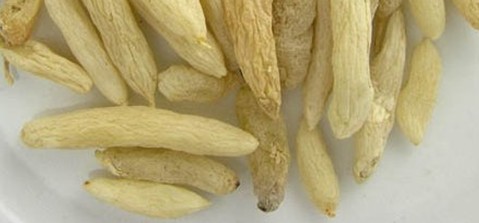Ophiopogon japonicus is a species of Ophiopogon native to Japan. Forests, dense scrub in ravines, moist and shady places on slopes and along streams, cliffs; 200--2800 m. Anhui, Fujian, Guangdong, Guangxi, Guizhou, Hebei, Henan, Hubei, Hunan, Jiangsu, Jiangxi, Shaanxi, Shandong, Sichuan, Taiwan, Yunnan, Zhejiang [Japan, Korea].
It is an evergreen, sod-forming perennial plant. The leaves are linear, 40 cm long. The flowers are white to pale lilac, borne in a short raceme on a 5–10 cm stem. The fruit is a blue berry 5 mm diameter. It is also grown as an ornamental plant, providing an excellent groundcover.
In Chinese medicine Ophiopogon japonicus tuber, known as mai men dong, is the cardinal herb for yin deficiency. According to the Chinese Herbal Medicine Materia Medica, the herb is sweet, slightly bitter and slightly cold, enters the heart, lung and stomach channels and nourishes the yin of the stomach, spleen, heart and lungs and clears heat and quiets irritability.
A unique collection of 27 natural compounds from Murraya exotica L.
A unique collection of 22 natural compounds from Saposhnikovia divaricata (Turcz.) Schischk.
A unique collection of 25 natural compounds from Epimedium brevicornum Maxim
A unique collection of 34 natural compounds from Catharanthus roseus (L.) Don
A unique collection of 38 natural compounds from Eucalyptus globulus Labill.
A unique collection of 27 natural compounds from Eucalyptus robusta Smith
A unique collection of 50 natural compounds from Glycyrrhiza uralensis Fisch.
A unique collection of 21 natural compounds from Citrus maxima (Burm.) Merr. cv. Wentan





